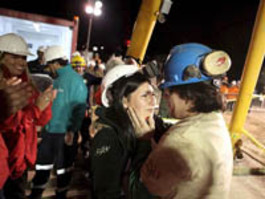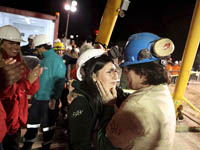Did you see that hastily snapped picture of Prince Charles and Camilla? On their way last Thursday evening to a London gala, the royal couple’s vintage Rolls Royce limousine inadvertently drove into an unrelated street riot and was suddenly engulfed by a sea of demonstrating youth. When the young rioters (who were protesting Parliament’s decision to hike tuition fees in UK universities) spotted the future king of England and his wife inside the automobile, they turned on the limousine, pelting it with eggs, smashing open a window and threatening to who-knows-what! The prince pushed his wife to the floor of the car to shield her. And their driver fortunately was able to flee the scene. The royals, though badly shaken, arrived at the gala in gracious spirits. They don’t treat future kings like they used to, do they? Which, of course, is the sad commentary on the story of Christmas as well. The King of the universe, come to earth as the promised Messiah, couldn’t even rent a motel room for his own birth! “For unto us a Child is born, unto us a Son is given; and the government will be upon His shoulder.” “And she . . . laid him in a manger, because there was no room for them in the inn” (Isaiah 9:6; Luke 2:7). Deitrich Bonhoeffer once reflected, “All Christian theology has its origin in the wonder of all wonders that God became man.” Wonder of all wonders, indeed. That wonder is nearly palpable in the The Desire of Ages chapter on Christ’s birth: “The King of glory stooped low to take humanity. Rude and forbidding were His earthly surroundings. His glory was veiled, that the majesty of His outward form might not become an object of attraction. He shunned all outward display. . . . With amazement the heavenly messengers beheld the indifference of that people whom God had called to communicate to the world the light of sacred truth. . . . It would have been an almost infinite humiliation for the Son of God to take man’s nature, even when Adam stood in his innocence in Eden. But Jesus accepted humanity when the race had been weakened by four thousand years of sin. . . . Wonder, O heavens! and be astonished, O earth!” (pp 43-49, selected) They don’t treat future kings like they used to, do they? Do we? The wonder of wonders in this season of Noel is not so much that God became a man . . . but that he even wanted to. For look how we treated him when he came to us. And is it any better today? In the words of that old spiritual, “Sweet little Jesus boy, they made you be born in a manger; sweet little holy Child, we didn’t know who you was.” But we do, don’t we? And so this Christmas will you join me in bowing low before the King—not as a perfunctory expression of Christian devotion, but rather as the quiet pledge of a redeemed vassal to gladly serve the King whose infinite sacrifice has purchased our freedom? “‘Worthy is the Lamb who was slain to receive power and riches and wisdom, and strength and honor and glory and blessing!’” (Revelation 5:12). Amen.
Pastors' Blog
By Pioneer Pastors

![Partridge in a Pear Tree Clipart [Converted] Partridge in a Pear Tree Clipart [Converted]](/sites/default/files/blog/wp-content/uploads/2010/12/partridge-in-a-pear-tree-clipart-converted.jpg) "12 Daze of Christma$”—that’s how the Boston Herald headlined the story this week of PNC Wealth Management’s annual analysis of the beloved Christmas song. You know the one: “On the first day of Christmas my true love gave to me a partridge in a pear tree.” Two turtle doves, three French hens, four calling birds, five golden rings . . . all the way up to “twelve drummers drumming.” Our friends at PNC (BTW, that’s not PMC, our congregation) Wealth Management—who in managing your wealth this year, apparently had time to spare—calculated how much it would cost you to give your “true love” the 364 gifts in the song. “The total cost for all 364 gifts mentioned in the popular yule time tune skyrocketed 10.8 percent [thanks to climbing gold prices] to more than $96,000.” That’s $96,824, to be exact! (http://news.bostonherald.com/entertainment/lifestyle/...)
"12 Daze of Christma$”—that’s how the Boston Herald headlined the story this week of PNC Wealth Management’s annual analysis of the beloved Christmas song. You know the one: “On the first day of Christmas my true love gave to me a partridge in a pear tree.” Two turtle doves, three French hens, four calling birds, five golden rings . . . all the way up to “twelve drummers drumming.” Our friends at PNC (BTW, that’s not PMC, our congregation) Wealth Management—who in managing your wealth this year, apparently had time to spare—calculated how much it would cost you to give your “true love” the 364 gifts in the song. “The total cost for all 364 gifts mentioned in the popular yule time tune skyrocketed 10.8 percent [thanks to climbing gold prices] to more than $96,000.” That’s $96,824, to be exact! (http://news.bostonherald.com/entertainment/lifestyle/...)
What shall we say about a culture that names the Friday after Thanksgiving—the Friday this year that found stores opening their doors to frenzied Christmas shoppers at 2 a.m., 3 a.m., 4 a.m., or stayed open all night—“Black Friday”? The day after we have theoretically thanked God for another year of divine benediction is black Friday? Early estimates for Black Friday purchases by Americans this year are $10.69 billion. (One hundred of those Black Fridays and we could pay off the nations’s $1.3 trillion budget deficit!) And as if Black Friday weren’t enough, Cyber Monday this week netted an estimated $1.023 billion of online Christmas sales, setting a new one-day record for cyberspace spending.
“And she brought forth her firstborn Son, and wrapped Him in swaddling cloths, and laid Him in a manger, because there was no room for them in the inn” (Luke 2:7).
Is it too late to celebrate a counter-cultural Christmas this year? To radically simplify our gift-giving? To inform our loved ones that this year a gift to charity in our names would be very special indeed (our church staff is trying that for the second time this year)? I’m not wanting to become the Grinch who stole Christmas—but I am asking myself if maybe the silver light of this season’s Narrative is utterly anti-commercial, counter-materialism—and that maybe there are more meaningful ways to commemorate His birth.
What if you gave Christ as a gift this year? Amazon.com carries a new edition of an old classic for $2.99! A friend sent me this new edition earlier this year, and I read it through over the summer. Gone are the old King James quotations. Replaced now with NKJV and even NIV in places, this new paperback edition of The Desire of Ages is a keeper. Go online and check it out for yourself. For $2.99 you could buy a dozen of them for your dearest family and friends. I promise you that this fresh new NKJV edition makes this magnum opus of Ellen White’s a heart-stirring read. It’s my favorite book. In it you’ll meet the counter-cultural Jesus as you never have before. What a Savior and Friend! Share him with your world. And let Christmas this year truly be about the Gift “my True Love gave to me.”

 MISS YOUR CELL PHONE? I read historian Benson Bobrick’s fascinating Wide as the Waters: The Story of the English Bible and the Revolution It Inspired. It’s the story of two English reformers—John Wycliffe, the brilliant Oxford scholar and Bible translator, remembered as “the Morning Star of the Reformation”; and martyr William Tyndale, whose English translation of Holy Scripture led to the King James Version and made the English Bible (next to the Bible itself) “the most influential book ever published.”
MISS YOUR CELL PHONE? I read historian Benson Bobrick’s fascinating Wide as the Waters: The Story of the English Bible and the Revolution It Inspired. It’s the story of two English reformers—John Wycliffe, the brilliant Oxford scholar and Bible translator, remembered as “the Morning Star of the Reformation”; and martyr William Tyndale, whose English translation of Holy Scripture led to the King James Version and made the English Bible (next to the Bible itself) “the most influential book ever published.”
The profound impression Bobrick’s history has left with me is the immensity of the debt we owe to these who sacrificed all so that we might possess our English Bibles today. So bright was the mind of Wycliffe that “even his later enemies agreed (as one confessed) that he was ‘second to none in philosophy, unrivalled in the Schools, and the flower of Oxford. Many divines esteemed him little less than a god.’ He wrote many works in Latin as well as English . . . and his theological tomes were as knotty and learned as those by any scholiast. One weary Czech scribe, copying out a section, exclaimed in the margin, ‘Dear God, help me to finish this work as quickly as I can’” (27). William Tyndale, from the protective cover of Holland, sent copies of his own English translation across the channel into England, and quietly the seeds of an eventual revolution—both spiritual and political—were sown. Not without price. On October 6, 1536, he was "brought forth to the place of execution, tied to a stake, strangled first by the hangman, then ‘with fire consumed.’ Before he lost consciousness, he cried ‘with a fervent zeal and a loud voice: “Lord, open the King of England’s eyes”’” (135).
At what price we possess our English Bibles this Thanksgiving! And yet are we really that thankful? Some dear soul forwarded to me a forwarded-forwarded-forwarded email (you know the type) with the simple query—“Ever wonder what would happen if we treated our Bible like we treat our cell phone?” Now the FW’ed piece had my attention. “What if we carried it around in our purses or pockets? What if we flipped through it several time a day? What if we turned back to go get it if we forgot it?” (That strikes home, because how many times have I remembered a couple blocks from home my cell phone back at the house? Leave it at home—are you kidding? I slam on my breaks, pull a quick U-turn—because I can’t live without my cell phone!) “What if we used it to receive messages from the text? What if we gave it to kids as gifts? What if we used it when we traveled? What if we used it in case of emergency?”
A century before cell phones Ellen White wrote: “The Bible is God's voice speaking to us, just as surely as if we could hear it with our ears. If we realized this, with what awe we would open God's Word and with what earnestness we would search its precepts. The reading and contemplation of the Scriptures would be regarded as an audience with the Infinite One” (My Life Today 283).
Then this Thanksgiving—even as we sing in the language of the old King James, “Come, ye thankful people, come”—shall we not fervently thank God for the inestimable gift of His Book?
Jesus just grew bigger! Ever since last Saturday the small Polish town of Swiebodzin has been high-fiving in celebration, believing they have just created the largest Jesus in the world. It’s been the life dream of their 78 year old local priest, Sylwester Zawadaki, to craft the world’s largest Jesus statue. And it looks like he just succeeded. When the crane lowered the golden-crowned statue head onto the granite body last weekend, the priest announced that his new “Christ the King” statue measures 108 feet or 33 meters, “one meter for every year that Jesus lived.” Some members of the construction team, however, said that if the mound upon which the statue towers and the crown atop the head are included, it rises 51 meters (167 feet). By contrast Rio de Janiero’s famed Christ the Redeemer statue stands 125 feet tall. So villagers are already counting the profits that will surely accrue once tourists begin pilgrimages to this giant Jesus.
A century ago the life ministry of a little 5’ 2” tall woman revealed that the Jesus in her heart stood very tall indeed. Through the years as I’ve read this woman’s writings, I have collected some of her “very tall Jesus” statements. Here’s one: “... were thousands of the most gifted men to devote their whole time to setting forth Jesus always before us, studying how they might portray his matchless charms, they would never exhaust the subject” (Review and Herald June 3, 1890).
Here’s another: “O precious, loving, long-suffering, long-forbearing Jesus, how my soul adores Thee! That a poor, unworthy, sin-polluted soul can stand before the Holy God, complete in the righteousness of our Substitute and Surety! Wonder, O Heavens, and be astonished, O earth, that fallen man is the object of His infinite love and delight” (Letter 2, December 29, 1889).
And another: “I love to speak of Jesus and his matchless love. I have not one doubt of the love of God. I know that he is able to save to the uttermost all that come unto him. His precious love is a reality to me, and the doubts expressed by those who know not the Lord Jesus Christ, have no effect upon me. ... Do you believe that Jesus is your Saviour, and that he has manifested his love for you in giving his precious life for your salvation? Take Jesus as your personal Saviour. Come to him just as you are; give yourself to him; grasp his promise by living faith, and he will be to you all that you desire” (Review and Herald June 23, 1896).
No question the Jesus of Ellen White was a towering Savior. That’s why at this website we’ve been carefully examining the gift of Christ through the life ministry of this woman. Why not examine the evidence for yourself—download the five podcasts/videocasts—call our toll free number (877 HIS WILL) and order a free copy of her best-selling and most translated classic, Steps to Christ (the little book that reintroduced me to my Savior at a crisis point in my young life—I’m certain it will bless you, too). Because you don’t have to go to Poland to meet the towering Jesus. If you want him, your door is large enough to let him in.

 Another election wrapped up, another terrorist plot averted. While I’m not suggesting this week’s two biggest headlines have any connection, have you ever wondered how proactive God is in the life of our civilization? He probably doesn’t keep an electoral scorecard of favorite politicians, and he certainly isn’t the author of evil conspiracies. Nevertheless, could it be that he is personally, actively very much engaged in what goes on around this planet? Let me explain.
Another election wrapped up, another terrorist plot averted. While I’m not suggesting this week’s two biggest headlines have any connection, have you ever wondered how proactive God is in the life of our civilization? He probably doesn’t keep an electoral scorecard of favorite politicians, and he certainly isn’t the author of evil conspiracies. Nevertheless, could it be that he is personally, actively very much engaged in what goes on around this planet? Let me explain.
I find particular comfort in a dusty line from the ancient prophet Daniel: “[God] changes the times and the seasons; He removes kings and raises up kings” (Daniel 2:21, 22). The New Living Translation renders that line, “He determines the course of world events.” Does that mean God works through the electoral processes of a democracy to put individuals into leadership/office who are sympathetic to his own agenda for humanity? He certainly did that with Nebuchadnezzar, the despot of Babylon who became a defender of the true God through the influence of Daniel.
History has repeatedly shown that all it takes is one receptive leader, open to the intervening Spirit of God, to protect God’s “defenseless” community of faith and thus advance the divine agenda and mission on earth.
But averting terrorist plots? Consider Daniel’s further depiction of our proactive God: “He reveals deep and secret things; He knows what is in the darkness, and light dwells with Him” (Daniel 2:22). Do you realize what might have happened had the “underwear bomber” last Christmas and the two cargo plane package bombs discovered this week (both plots linked to the same Islamic terrorist organization) successfully detonated? With no immediate or obvious clue for the explosion(s), air travel as we know it would certainly have been instantly halted—impacting international commerce, exchange, finances, economics, politics in ways we cannot now fathom. And we can only imagine the deleterious effects on the growth of God’s kingdom on earth.
But the evil that is plotted in darkness is seen and known to the God who is light. “He determines the course of world events.” Which is why I pray two prayers when I read of averted terror—#1, thanks be to God, who has once again prevented the closing of a global door to the advance of his everlasting gospel on earth; and #2, God be merciful to his 1.4 billion Muslim children and protect them from the raging backlash that would diminish their openness to the truth about His character.
A century ago Ellen White observed: “In the annals of human history the growth of nations, the rise and fall of empires, appear as dependent on the will and prowess of man. The shaping of events seems, to a great degree, to be determined by his power, ambition, or caprice. But in the word of God the curtain is drawn aside, and we behold, behind, above, and through all the play and counterplay of human interests and power and passions, the agencies of the all-merciful One, silently, patiently working out the counsels of His own will” (Education 173). Elections and terrorist plots included? But of course. Which is why he is God. And why we can be very grateful.
Too early to be thinking about Christmas? Not if you were hoping to purchase the fastest and most expensive Porche ever built—the 911 GT2 RS. It just sold out less than two months after debuting. Price tag? $329,000. Merry Christmas and a big red bow tied on to the 131 Americans who bought it.
Never mind the recession. Reports show that luxury items are once again ringing the cash registers in the U.S. “Consumers are buying more luxury items but spending remains tight for everyday essentials such as food and dental care, a USA TODAY analysis finds, suggesting a growing divide between haves and have-nots. Purchases of TVs, jewelry, recreational vehicles and pet supplies are growing robustly, government data show. At the same time, spending on medical care, day care and education is down in the dumps” (http://www.usatoday.com/money/economy/2010-10-27-RW_consumer27_ST_N.htm).
The yawning gap between the haves and the have-nots in this nation is widening. And it does not bode well for our future. One in 8 Americans is now on food stamps. At some point within last year, 1.6 million men, women and children (including 170,000 families) “experienced homelessness”—a 7% jump from the previous year. Voice of America this week quoted Henry Freedman, director of the National Center for Law and Economic Justice. “Freedman says America's growing income gap could create a two-tiered society that loses its sense of community. ‘People struggling to get by, struggling to survive on the one hand, susceptible to demagoguery; and people on the other hand who put their resources to be separate from society, safe from society rather than participating fully in society,’ he said” (http://www.voanews.com/english/news/usa/US-Income-Disparity-Highest-Ever-105708773.html).
Did you catch that—“a two-tiered society that loses its sense of community”? The wealthy growing more isolated, the poor growing more resentful The Apostle James predicted just such an economically fractured society before the return of Christ: “Come now, you rich, weep and howl for your miseries that are coming upon you! . . . Indeed the wages of the laborers who mowed your fields, which you kept back by fraud, cry out; and the cries of the reapers have reached the ears of the Lord of Sabaoth. You have lived on the earth in pleasure and luxury; you have fattened your hearts as in a day of slaughter.” And then to his impoverished readers, James appeals: “You must be patient. And take courage, for the coming of the Lord is near” (James 5:1, 4, 5 NKJV; 7 NLT).
Will our politicians deliver us from this social fracture? Hardly. They have just spent a record-setting $2 billion campaigning for next week’s election. How then will economic disparity be confronted? I’m not a prophet—but I read the prophets. Watch the labor movement globally. What France has experienced these past two weeks (and Greece earlier)—pent up rage by the lower class—can happen here, too. A century ago this prediction was made: “The trade unions will be the cause of the most terrible violence that has ever been seen among human beings” (Letter 99, 1904).
What shall we do? Let the church of Christ rise up with the compassion of her Lord and reach out to the disenfranchised and economically marginalized. Benton Harbor is 12 miles away. Our fledgling Harbor of Hope congregation desperately needs volunteers. Call Pastor Walter (849-9089). It isn’t new Porches that our world is dying for want of. It is men and women possessed with Jesus’ passion and brave enough to attempt to make a difference. Before he returns. Until he returns.
“Savior Siblings” was the newspaper headline. Molly Nash is sixteen years old now—and very much alive. But in 2000 the promise of any future at all was doubtful. Molly was born with a severe type of Fanconi anemia, “a blood disorder that almost always results in leukemia by the age of 10.” Her only hope a bone marrow transplant. And the optimal transplant donor needed to be a sibling with genetically identical tissue. But Molly was an only child. Until Dr. John Wagner—a bone marrow transplant expert at the University of Minnesota—suggested a brave, novel protocol. Would Molly’s parents be willing to undergo in-vitro (“test tube”) fertilization to create multiple embryos—with the hopes of finding one embryo without the genetic coding for Fanconi anemia?
After multiple rounds of in-vitro fertilization “and tens of thousands of dollars borrowed from Jack’s parents,” at last a genetically “perfect” embryo was formed. Nine months later little Adam was born into the Nash family—and six weeks after that, Molly received her transplant from the blood in her baby brother’s umbilical cord. Today ten years later she’s the picture of health—and seemingly unimpressed with her “irritating little brother” who became a “savior sibling” in order to save her life (SBTribune 10-20-10).
Two reflections on this news piece. #1—When something is truly worth it, you don’t quit trying. Jack and Lisa Nash, Molly’s parents, apparently thought so. So they invested multiple attempts at tens of thousands of dollars in order for their prayers to be answered. Shouldn’t we do the same? For 53 days now we’ve been asking God to revive our hearts and church and school, and to save our lost friends and family. Shall we quit now? Hardly! Jesus’ command to “ask for the Holy Spirit” (Luke 11:9, 13) literally means “to keep on asking.” And keep on we must! Beginning next week, the opening page of our worship bulletin-booklet will feature fresh ways we can keep on asking. After all, isn’t the promised answer worth it?
#2—Our Creator became our Savior Sibling. On this Creation Celebration Sabbath we remember that the Creator of this universe was born in a manger to become our Elder Brother. “ . . . in these last days [God] has spoken to us by his Son, whom he appointed heir of all things, and through whom he made the universe. . . . For this reason he had to be made like his brothers in every way, in order that . . . he might make atonement for the sins of the people” (Hebrews 1:2; 2:17 NIV). No wonder our Creator is twice worthy of our worship—first he made us, and then he saved us. With our Savior our Sibling, is it any wonder we must never quit praying now?

 The rescue of the 33 Chilean miners, trapped for 69 days a half a mile beneath the mountain, is a story for the ages, isn’t it? Can you imagine the ecstatic joy that exploded into the cold night air, as that bullet-shaped recovery capsule emerged from out of the ground, transporting the first of the entombed captives to freedom? Desperate hope had become reality. The captives were coming home!
The rescue of the 33 Chilean miners, trapped for 69 days a half a mile beneath the mountain, is a story for the ages, isn’t it? Can you imagine the ecstatic joy that exploded into the cold night air, as that bullet-shaped recovery capsule emerged from out of the ground, transporting the first of the entombed captives to freedom? Desperate hope had become reality. The captives were coming home!
Did you know that one of the miners is a Seventh-day Adventist? Pedro Navia, the chair of the International Language Studies department here at Andrews University, several weeks ago sent to me a scanned copy of a hand-written letter the trapped miner wrote to his pastor. According to Dr. Navia, the church in Chile sent this pastor to the mining disaster site to minister to the miners’ families. The pastor even sent small Bibles down the lifeline shaft for the miners to read every day. Here is the translated letter in its entirety:
Pastor Carlos Parra Diaz,
From down here, my greetings to you and your family. Thank you for praying for us, the 33 miners.
I want to tell you that here we are all calm and I know God, the Mighty God, has protected us since the first day that this happened. Here we pray at 12:00 noon every day since the collapse took place. Here I can see all beliefs and religions, but we are all brothers in Christ. It is hard for me to write… I feel something here inside of me and it is difficult to think… If God has preserved our lives it is just because He has prepared something special for us when we leave this place. Here, there is a lot of time to think and pray.
For you and your family: “Only Jesus gives us rest and our heavy load becomes something light and easy to carry. A scene full of hope opens in front of us where our sorrows become a consoling future”.
Good bye to you and to everyone in your family,
Jose Ricardo Ojeda
“Miner Heart”
I love that line, “A scene full of hope opens in front of us, where our sorrows become a consoling future.” For how could rescue of these entombed miners not be a foretaste of that explosive moment when He who is the Resurrection and the Life will call from their dusty beds of death his earth children one day soon? Listen to the jubilant exclamation of the second miner to be rescued. “I never doubted. I always knew God would rescue us,” Mario Sepulveda proclaimed. “‘I am so very happy,’ added the miner who was surrounded by family members holding his hands or touching him, as if to be sure he was really there. ‘I'm 40 years old and will live many years more now to honor those who helped’ in the rescue” (http://www.latimes.com/news/nationworld/world/la-fg-chile-miner-rescues-20101014,0,1311890.story).
For nine days now, Lee Venden has been teaching us that our Forever Friend has already shattered the chains of guilt and fear that entomb us. “A scene of hope opens in front of us.” Knowing we have been loved to the depths of Calvary, we can walk with our Friend Jesus—revived, set free, to live the rest of our lives to honor the One “who loved me and gave Himself for me” (Galatians 2:20). And whether we live or whether we die, “a scene full of hope opens in front of us where our sorrows become a consoling future.” Amen.
What’s not to like about a golden anniversary? Fifty years ago Emmanuel Missionary College became Andrews University, and this campus has never been the same! But what about a ruby anniversary? Did you know that forty years ago next week (which makes it a “ruby” commemoration, for those who keep track) there was a spiritual event on campus (it actually began off campus) that has left this university not quite the same ever since? Two weeks ago in my blog I reported on Beatrice Neall’s recital (“When God Came Down”) of what took place in the now hallowed fall of 1970 here at Andrews. An off-campus spiritual retreat attended by a hundred students, the igniting there of a collective fiery passion to be filled with the Spirit of Jesus, their return to campus after the weekend on fire for change, the Tuesday chapel that turned into an hours-long testimony service, the conversion of students and faculty, the spirit of grace and repentance and a fervor to witness for Christ that spread through the dormitories and cafeteria and classrooms, the subsequent contagion of Andrew’s revival at AUC and CUC and Oakwood and SMC—all of it began forty years ago October 8.
Was it genuine, for real? A few Wednesday evenings ago I was reading to our House of Prayer worshipers portions of Bea Neall’s history of that revival, and during our testimony time two hands shot up. Turns out that both of them were students at Andrews that fall, and both of them participated in that memorable Tuesday chapel spiritual outbreak. Yes it was genuine, and truly for real—as no doubt some of our alumni here for Homecoming this weekend could attest—the unforgettable 1970 Autumn at Andrews.
But quite frankly, I’m not one for spending a whole lot of time looking back, gratifying as the memories might be. Truth is we’re a new generation living in essentially a new era marked by socio-political-economic forces vaguely similar but radically different. Which is why we need for God to do “a new thing” (Isaiah 43:19) in our midst—a new revolution, a new revival and reformation. Is it too idealistic, too naïve to ask for such from God? Hardly!
A century ago the one who picked out this farmland to be Battle Creek College’s new site beside the St. Joseph River penned: “A revival of true godliness among us is the greatest and most urgent of all our needs. To seek this should be our first work. . . . A revival need be expected only in answer to prayer” (1SM 121, emphasis supplied).
Only in answer to prayer? Then wouldn’t it be right to invite alumni and students to band together in this shared “urgent” prayer? Of course, strategic plans and capital/faculty development and student recruitment are essential to a growing, thriving university community. But living on the edge as we are, it surely has occurred to more than a few of us that without fervent prayer for the unleashing of the Spirit of Christ deep within our collective heart and soul we are destined to live with the bar “raised low,” at a time when all of Heaven pleads for the bar to be raised higher and higher and higher still. “I have heard all about you, LORD, and I am filled with awe by the amazing things you have done. In this time of our deep need, begin again to help us, as you did in years gone by. Show us your power to save us” (Habakkuk 3:2 NLT).
It’s a funny-named hometown. But could it be we’re all from there—that little berg with its lonely water tower? Known for miles around, the water tower was fed by an aqueduct from hot springs a few miles away. Naturally, the water started out piping hot, but by the time it spilled into the water tower it was lukewarm. So it’s no surprise that when the risen Christ sends a communiqué to the church in that town of Laodecia, he seizes the city’s trademark lukewarm water to shape his appeal to all of us. “I wish you’d make up your mind—be hot for Me or be cold toward Me—but don’t give me this tepid, half-hearted lukewarm commitment stuff. It’s enough to gag you!” Or as he put it in Revelation 3, “‘Because you are lukewarm, and neither cold nor hot, I will vomit you out of My mouth’” (Revelation 3:16). Yuck!
But hold on! In this campus-wide season of 40 Days of Prayer, I was especially blessed by Dennis Smith’s reading this week for Day 22. Watch what he does. Linking Jesus’ invitation to the Christians in Laodecia—“‘Look! Here I stand at the door and knock. If you hear me calling and open the door, I will come in, and we will share a meal as friends’” (v 20 NLT)—with I John 3:24’s observation—“And we know he [Christ] lives in us because the Holy Spirit lives in us”—Smith concludes that the divine solution for my and our lukewarm apathy is to be baptized by the Holy Spirit. “What will the baptism of the Holy Spirit do for a lukewarm Christian? The infilling of God’s Spirit will bring revival to the recipient, and revival is the only answer to Laodecia’s [lukewarm] problem. . . . Only by revival will the church come to a spiritual condition such that God can use her in a mighty way as a means of delivering men and women from the powers of darkness” (40 Days p 76, emphasis supplied).
We need that revival! It’s the only cure for our church and campus. No wonder a century ago these words were written: “A revival of true godliness among us [piping hot commitment to God] is the greatest and most urgent of all our needs. To seek this should be our first work” (1SM 121, emphasis supplied). For that very reason on September 1 we began 40 Days of Prayer at Andrews and Pioneer—earnestly asking God to pour out his Spirit upon us individually as well as institutionally. Won’t you join us? We’ve handed out 2,000 40 Days books, because there are many, many of the young and the not so young who are convicted that our deepest need around here is for the outpouring of the Spirit of Christ among us. So today at the foot of the cross, let us plead:
Baptize us anew with power from on high,
With love, O refresh us! Dear Savior, draw nigh.
We humbly beseech Thee, Lord Jesus, we pray,
With love and the Spirit baptize us today.
—W. A. Ogden
- ‹ previous
- 48 of 64
- next ›